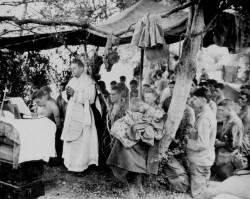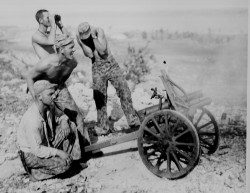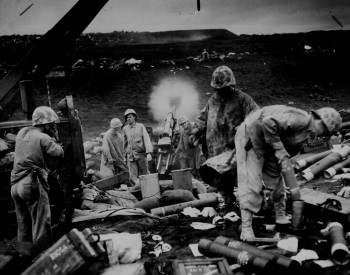“Fighting an Enemy,” Bill Cross (WWII-021)
By Maria Fuentes, Intern
 Listen: Oral history interview clip at UFDC with Bill Cross 02:35
Listen: Oral history interview clip at UFDC with Bill Cross 02:35
Bill Cross was born in Missouri during 1925 but raised in Kenosha, Wisconsin. He lived during the Depression and enlisted in the Marine Corps in April of 1943. He, along with his fellow male classmates, enlisted out of a sense of duty; he describes leaving for the military as “you had to go.” In the Marines, Bill Cross was taught a certain ideology out of the Marine Corps Manual or, as he called it, the “bible of the Marine Corps,” which created an identity through nationalism at the expense of Others. He recalls being drilled on how he was the “best fight man” and the “toughest man.”
 Bill Cross remembers the Marine Corps ideology as a focus on building up his own morale and esteem. Yet, he also mentions how Marine Corps officials emphasized hatred towards the Japanese. The Japanese were described negatively as; the only positive thing the commanding officers enforced was how they were “ferocious fighters”, and “crazy as hell.” So, by building up the Marines and creating distinctions with the Japanese as the ethnic “Other,” the Marine Corps was following similar procedures that occur in nation building and nationalism. Bill Cross recalls the importance of the drills and training had on the Marine Corps ideology. Their method was “put[ting] the fear of that philosophy into you because they knew it was right;” if not, “you’re going to be a dead marine.”
Bill Cross remembers the Marine Corps ideology as a focus on building up his own morale and esteem. Yet, he also mentions how Marine Corps officials emphasized hatred towards the Japanese. The Japanese were described negatively as; the only positive thing the commanding officers enforced was how they were “ferocious fighters”, and “crazy as hell.” So, by building up the Marines and creating distinctions with the Japanese as the ethnic “Other,” the Marine Corps was following similar procedures that occur in nation building and nationalism. Bill Cross recalls the importance of the drills and training had on the Marine Corps ideology. Their method was “put[ting] the fear of that philosophy into you because they knew it was right;” if not, “you’re going to be a dead marine.”
Right: Saipan invasion. Navy chaplain holds mass for Marines at Saipan to commemorate those who died during initial landings.
 In combat, Cross proves that fear of the “Other” worked well for him and probably for other soldiers. After a battle, Cross went up to the Japanese to negotiate a surrender and during this time he listened to his teachings and remained cautious of the Japanese’ tendency towards tenacity. While negotiating with an official, Cross watched as another Japanese soldier attempted to throw a grenade at him. Luckily he was observant and ran out of the way. He recalls running as if “I coulda beat Jesse Owens by a hundred yards in a hundred yard dash.” He insists that there are other stories like this about the tenacity of those “damn Japanese marines” and implies that being aware of them kept him safe and observant. After the war, Cross still held on to negative feels towards the Japanese due to his training yet still respects the Japanese as fighters. He continued to associate his survival with the training he received and the ideology instilled in him by the Marine Corps.
In combat, Cross proves that fear of the “Other” worked well for him and probably for other soldiers. After a battle, Cross went up to the Japanese to negotiate a surrender and during this time he listened to his teachings and remained cautious of the Japanese’ tendency towards tenacity. While negotiating with an official, Cross watched as another Japanese soldier attempted to throw a grenade at him. Luckily he was observant and ran out of the way. He recalls running as if “I coulda beat Jesse Owens by a hundred yards in a hundred yard dash.” He insists that there are other stories like this about the tenacity of those “damn Japanese marines” and implies that being aware of them kept him safe and observant. After the war, Cross still held on to negative feels towards the Japanese due to his training yet still respects the Japanese as fighters. He continued to associate his survival with the training he received and the ideology instilled in him by the Marine Corps.
Right: During invasion of Saipan, Marines use mountain gun which they captured from the Japanese.
Photos from Archives.gov. Top: Marines of the 4th Division during Battle of Iwo Jima. For additional information about these and other histories, contact SPOHP, call the offices at (352) 392-7168, and connect with us online today.
